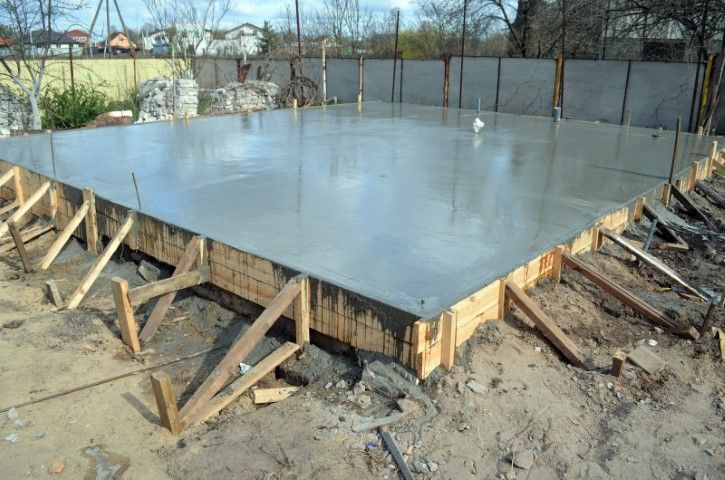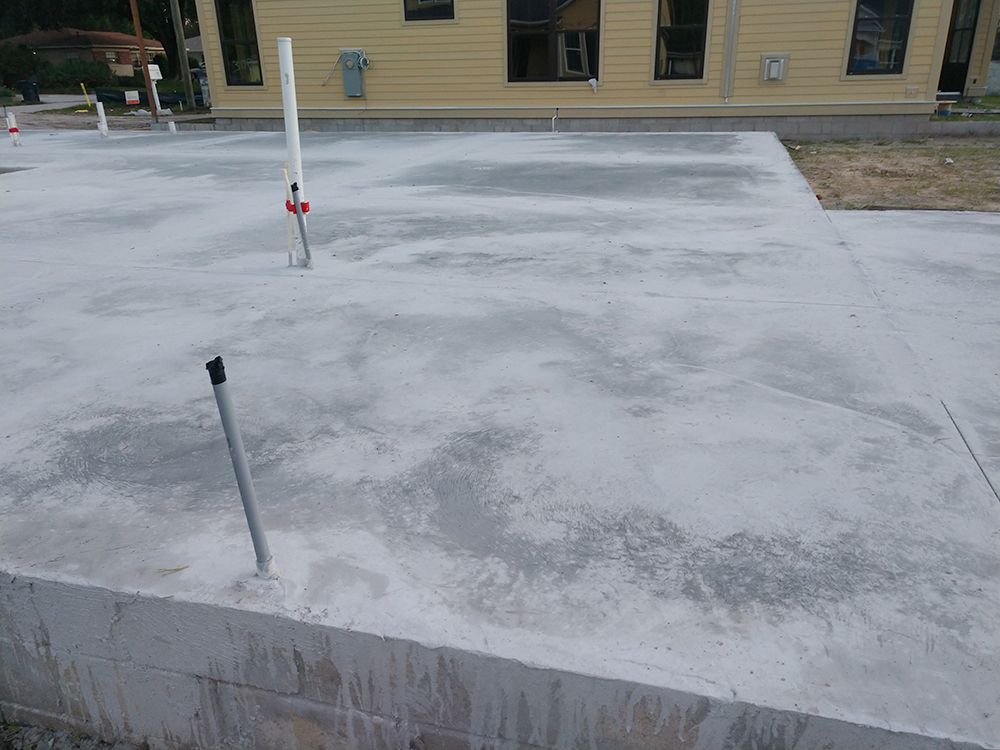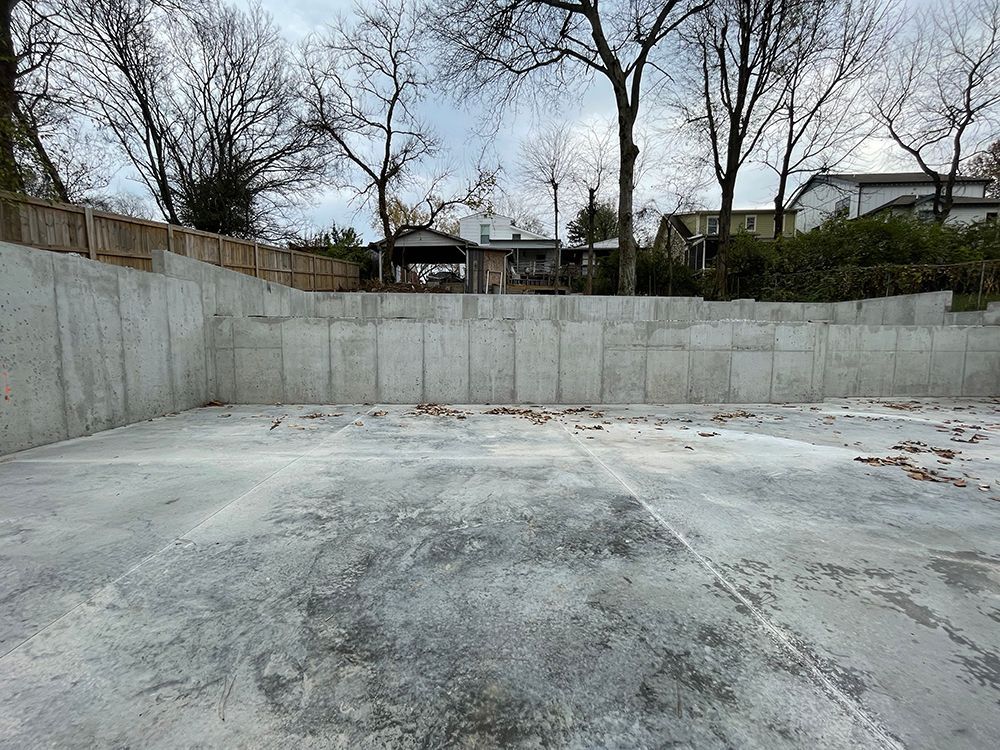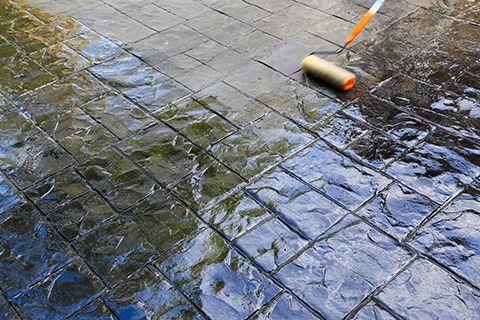Affordable Concrete Foundation Pouring in Gallatin, Tennessee
Elevate Your Property with Concrete Straight Away’s Superior Concrete Foundation Services
When it comes to enhancing your property's appeal and ensuring long-term durability, you shouldn't compromise on the quality of your home’s concrete foundation. At Concrete Straight Away, we take immense pride in our unparalleled expertise and commitment to delivering foundations of the highest caliber. With a focus on precision and durability, our team of seasoned professionals is dedicated to making foundations that not only withstand the test of time but do the job of creating a reliable transfer of weight so the home doesn’t sink once it’s constructed.
What We Offer
- Residential Foundation Construction
- Custom Home Foundation Design
- Driveway Foundation Installation
- Concrete Pad Construction
- Foundation Repair and Restoration
- Customized Driveway Design
- Foundation Waterproofing Solutions
- Concrete Resurfacing and Refinishing
- Structural Reinforcement and Enhancement
- Professional Foundation Inspection Services
Uncompromising Quality Assurance for Lasting Satisfaction
What sets Concrete Straight Away apart from the competition is our commitment to precision at every stage of our work. We meticulously prepare each site, using premium concrete materials and the latest industry techniques. With a dedicated focus on skilled craftsmanship, our team ensures that every foundation pouring project is executed with care and expertise, resulting in a solid infrastructure that does the job without faltering.
Recognizing the pivotal role of a sturdy foundation for various structures, including garages, large sheds, new homes, and commercial buildings, is paramount. We take pride in exceeding industry standards, catering to your specific foundation needs with exceptional attention to detail. By implementing superior materials and rigorous quality control measures, we ensure that your foundation remains resilient against all environmental elements, ensuring its durability even under the most challenging conditions.
Expert Guidance from our Skilled Team of Concrete Specialists
Our owner prefers to take a hands on approach, providing all customers with personalized guidance and comprehensive support throughout the entire process while our team of experienced concrete contractors dedicates their time to setting each job correctly. Leveraging our in-depth understanding of essential concrete properties, including compressive strength, durability, and workability, we ensure that the foundation pouring process aligns seamlessly with your unique requirements and the specific demands of the engineers who speced the foundation for your property. With a wealth of expertise in concrete technology, our team brings a level of proficiency that guarantees a foundation in Middle Tennessee by our crew is built to last.
What is a Good Concrete Foundation?
A well-constructed concrete foundation is characterized by meticulous planning, precise execution, and the use of high-quality materials. It involves thorough site preparation, including proper excavation and compaction, to ensure a stable base. The concrete is poured evenly and smoothly, with careful attention to leveling and the proper reinforcement of fiber in the concrete. Adequate curing time is allowed, and the foundation is meticulously inspected to ensure uniformity and strength. A good foundation adheres strictly to building codes and industry standards, offering long-term durability and structural resilience, with minimal risk of cracks, settling, or other structural issues.
What is a Subpar Concrete Foundation?
A poorly executed concrete foundation may exhibit several visible and underlying issues. It might result from inadequate site preparation, leading to an unstable base and potential settling. Improper pouring techniques can cause uneven surfaces, air pockets, or insufficient strength, making the foundation susceptible to cracks and structural weaknesses. Inadequate reinforcement or the use of substandard materials can compromise the foundation's overall stability, leading to potential shifts, water seepage, or even structural failure. A subpar foundation often falls short of meeting building code requirements, posing safety risks and potentially costly repairs or renovations in the future.
What Separates a Good Foundation To a Bad One?
A solid concrete foundation is the backbone of any sturdy structure, ensuring durability and stability. When done right, it supports the entire building, while a poorly constructed one can lead to structural issues and costly repairs. A reliable concrete foundation service employs precise techniques and top-notch materials, following strict building codes to guarantee long-term strength and resilience. These services are vital in creating a dependable base for homes, buildings, and various structures, safeguarding against potential damage and ensuring lasting quality. With years of experience and a proven track record of excellence, we at Concrete Straight Away take pride in delivering reliable and top-notch concrete foundation pouring services. We understand the importance of a strong and well-crafted foundation, and our commitment to quality craftsmanship and attention to detail has set us apart in the industry for many years.
What Makes a Foundation Last Longer?
High-quality materials like a durable concrete slab or cement slab form a strong base. We don't use rebar unless the customer specifically requests this, but all concrete we order comes with fiber in it which serves the same purpose.
Proper construction techniques including precise foundation pouring, accurate leveling, thorough reinforcement, and strategic formwork installation, are crucial for ensuring structural integrity and the long-term stability of your foundation.
Implementing a well-designed concrete pad and following established building codes. Building codes typically include regulations set by local or national authorities that dictate the minimum standards and requirements for constructing safe and structurally sound buildings.

These codes often cover various aspects of construction, such as structural design, fire safety, electrical systems, plumbing, mechanical systems, and accessibility. They are put in place to ensure the safety and welfare of the public and to establish guidelines that need to be followed during the construction process. Following these codes is crucial in guaranteeing that the building or structure is safe, stable, and compliant with legal requirements.
Regular maintenance, such as inspecting for any signs of wear or damage, helps prevent potential issues from developing into major concerns.
Step by Step Process on How to Construct a Foundation
Site Preparation
If not already done, we clear the construction area of any debris and vegetation, ensuring a clean and level surface for the foundation.
Excavation and Grading
We'll dig the trenches or holes for the foundation, ensuring the proper depth and dimensions as per the building plans. Then we grade the soil to create a stable base for the foundation. This is usually done with a skid steer to help expedite this process.
Installation of Footings
We pour and level the footings, which provide additional support for the foundation and distribute the load of the structure evenly.
Formwork Construction
Set up the formwork, creating a mold for the concrete to be poured into, ensuring it follows the design and layout specified in the building plans. Our go-to material for this is timber, often in 2- x 4-inch or 2- x 6-inch size.
Concrete Pouring
We pour the concrete into the formwork, ensuring even distribution and complete coverage of the designated area. Depending on the size, this involves multiple team members and a slew of tools like finishing trowels and bull floats as we start to get it leveled and help to bring liquid up to the surface.
Curing and Setting
Allow the concrete to cure and set properly, providing ample time for it to achieve its full strength and durability.
Finishing Touches
Once the concrete has cured, we remove the formwork and perform any necessary finishing touches, such as further smoothing the surface and addressing any minor imperfections.
Quality Inspection
Conduct a thorough quality inspection to ensure that the foundation meets all structural requirements and adheres to building codes and standards.
Backfilling and Drainage
Finally, we'll backfill the surrounding area and implement proper drainage systems to prevent water accumulation and potential damage to the foundation.
In general, this step-by-step process helps ensure the proper construction of a strong and durable foundation, setting the stage for a secure and stable structure that will hold up over time.
The Importance of Proper Foundation Installation
Building a strong foundation for your home or other structure is a crucial process. We adhere to industry best practices, focusing on careful planning, precise site preparation, and accurate installation of footings and foundations. With our extensive experience in land preparation and adherence to Tennessee's building codes, we ensure the optimal thickness of the concrete and proper leveling of corners. A solid foundation sets the stage for a sturdy and durable structure, making it a vital step in the construction process.
Neglecting the foundation's design can lead to significant problems. Improperly prepared ground and neglected soil can cause settlement, resulting in cracks in bricks, drywall, flooring, or the foundation itself. This can lead to the need for an engineer to assess the property and address any structural concerns.
Effective planning also involves considering drainage and grading. It's essential to ensure that water is directed away from the foundation, preventing issues like basement leaks or tilting floors. Neglecting these aspects could lead to various problems, including sticking doors, protruding walls, or even detachment of counters and cabinets from the walls. In severe cases, it can compromise the entire structure's stability. Making informed decisions during the foundation installation process is crucial to avoid potential issues and ensure the long-term durability of your property.
What are the Types of Foundation?
There are several types of foundations used in construction, each serving different structural needs and requirements. The common types of foundations include:

The above options are your most typical residential foundations. Below, you will see larger and more commonly used options for commercial foundations:
Each type of foundation has specific applications based on factors such as soil conditions, the weight of the structure, and the local climate. Choosing the right type of foundation is crucial for ensuring the stability and longevity of any construction project.
We've got you covered for all your foundation needs. Whether it's the standard strip foundation or the more robust raft or mat foundation, we can handle it all. Need something more specialized? We're experts in piled, pier, trench, and basement foundations too. Count on us to take care of your specific construction demands, ensuring a solid foundation that stands the test of time.
Contact Us for Your Concrete Foundation Pouring Needs!
Are you in need of precise and professional concrete foundation pouring tailored to the exact specifications on your building plans? Our team of experienced engineers and certified concrete specialists is ready to transform your vision into a structurally sound reality. Contact us today to discuss your project requirements and explore how our thorough approach to foundation construction can provide a solid and enduring base for your property. Let us guide you in creating a durable and visually striking foundation that serves as the cornerstone of your property's long-term stability and aesthetic appeal.








